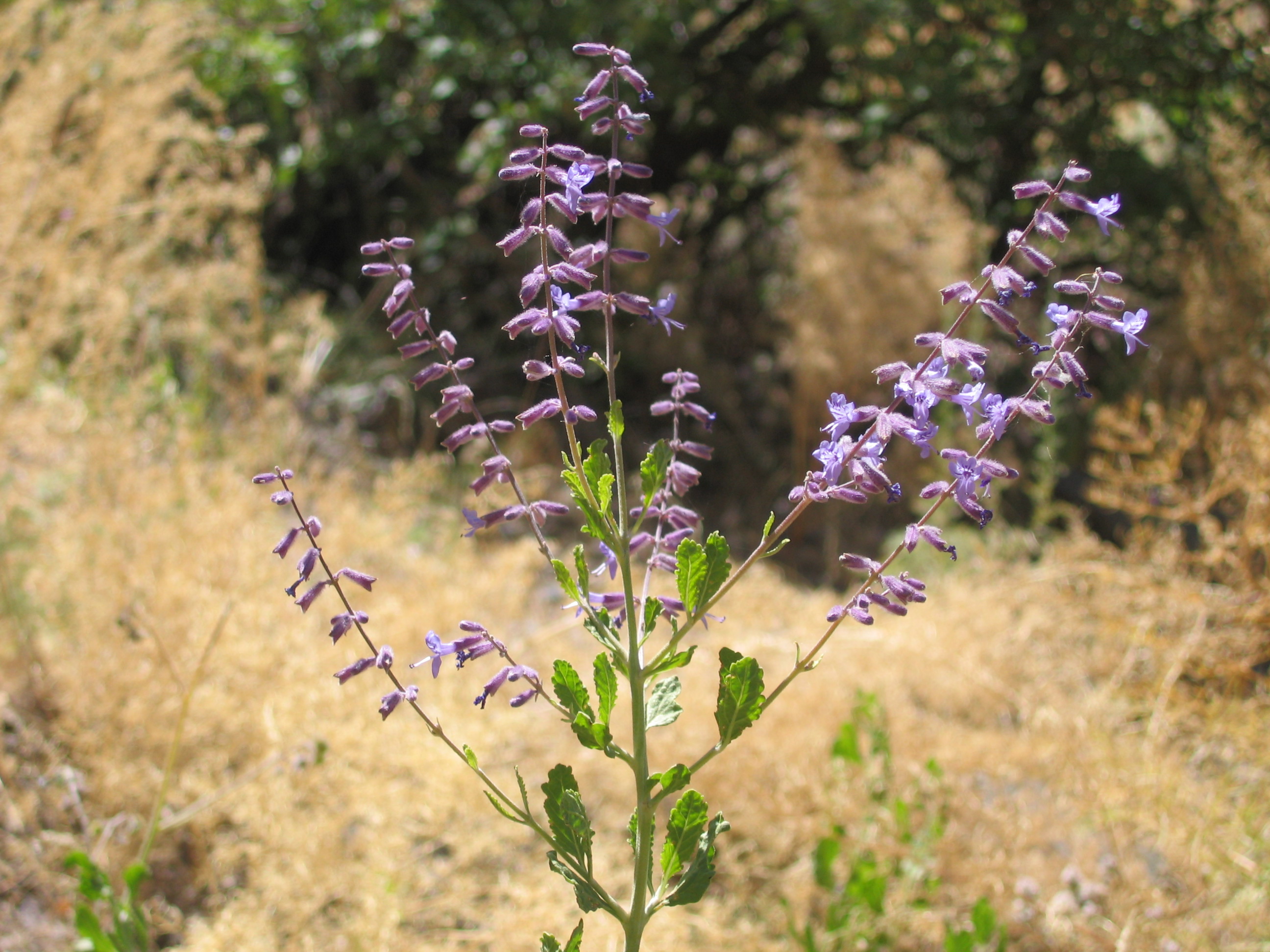COMPONENT COMPOSITION OF ESSENTIAL OILS FROM LEAVES, INFLORESCENCES AND STEMS OF PEROVSKIA SCROPHULARIFOLIA GROWN IN UZBEKISTAN
UDK 582.949.2:665.527.5
Abstract
Essential oils as secondary metabolites, promising sources of biologically active substances with pronounced antimicrobial, antifungal and antiviral effects, are of considerable interest for study and possible use in medicine, pharmaceuticals, and aromatherapy. We have studied the composition of the essential oil of an endemic species for the first time Perovskia scrophularifolia Bunge. (Lamiaceae = Labiatae). This species of plant is of considerable interest as a medicinal plant, which is widely used in folk medicine in Uzbekistan and neighboring countries. Studies of biologically active substances of this species did not concern the essential oil. During the period of mass flowering in the inflorescences of Perovskia scrophularifolia contains 0.65%, in leaves – 0.71% of essential oil. The stems of the plant contain essential oils in small quantities. The composition and content of the components of the studied samples were determined according to the data of gas chromatographic and chromate-mass-spectrometric analysis. 26 substances were identified in essential oils from leaves, 43 from inflorescences and 18 substances from stems. The main components of essential oils from leaves and inflorescences are 1,8-Cineol up to 19.3% and Isobornyl acetate – up to 15.9%. This species is a promising source of biologically active compounds with biological activity (including antibiotic).
Downloads
Metrics
References
Gorshkova S.G. Flora SSSR. [Flora of the USSR]. Moscow – Leningrad, 1954, vol. 21, pp. 374–381. (in Russ.).
Dzhumaev K. Aktual'nyye voprosy izucheniya i ispol'zovaniya efiromaslichnykh rasteniy i efirnykh masel. [Topical is-sues of the study and use of essential oil plants and essential oils]. Simferopol, 1980, pp. 96–97. (in Russ.).
Kenzhebaeva N.V., Ganybaeva M.A. Lekarstvennyye rasteniya Kyrgyzstana v narodnoy meditsine [Medicinal plants of Kyrgyzstan in folk medicine]. Bishkek, 2009, pp. 99–103. (in Russ.).
Aizenman S., Zaurov D.E., Shalpykov K.T. Lekarstvennyye rasteniya Sredney Azii: Uzbekistan i Kyrgyzstan. [Medici-nal plants of Central Asia: Uzbekistan and Kyrgyzstan]. Bishkek, 2014, 347 p. (in Russ.).
Nuriddinov K.R., Khodzimatov K.K., Aripov K.N., Ozek T., Demirchakmak B., Basher K.H.C. Chem. Nat. Comp., 1997, vol. 33, pp. 299–300. DOI: 10.1007/BF02234879.
Takeda Y., Hayashi T., Masuda T., Honda G., Takaishi Y., Ito M., Otsuka H., Matsunami K., Khodzhimatov O.K., Ashurmetov O.A. J. Nat. Med., 2007, vol. 61, Pp. 84–85. DOI: 10.1007/s11418-006-0023-9.
Abduganiev B.E., Abdullaev U.A., Plugar V.N. Chem. Nat. Comp., 1995, vol. 31, pp. 475–477. DOI: 10.1007/BF01177415.
Mamadalieva N.Z., Akramov D.K., Ovidi E., Tiezzi A., Nahar L., Azimova S.S., Sarker S.D. Medicines, 2017, vol. 4(1), article 8. DOI: 10.3390/medicines4010008.
Dembitsky A.D. Vestnik Akademii nauk Kazakhskoy SSR. Khimicheskaya seriya, 1984, no. 4, pp. 4–10. (in Russ.).
Karryyev M.O. Farmakokhimiya nekotorykh efiromaslichnykh rasteniy flory Turkmenii. [Pharmacochemistry of some essential oil plants of the flora of Turkmenistan]. Ashkhabad, 1973, 153 p. (in Russ.).
Ramazanova N. Ecological and biological features of the most important raw plants in culture. Tashkent, 1978, pp. 133–138.
Khazanovich R.L., Khalmatov Kh.Kh., Akhmedova F.G. Issledovaniye nekotorykh lekarstvennykh rasteniy Uzbeki-stana. [Study of some medicinal plants of Uzbekistan]. Tashkent, 1963. 139 p. (in Russ.).
Dzhumaev Kh.K., Tkachenko K.G., Zenkevich I.G., Tsibul′skaya I.A. Rastitel'nyye resursy, 1989, vol. 25 (2), pp. 238–240. (in Russ.).
Dzhumaev Kh.K., Zenkevich I.G., Tkachenko K.G., Tsibul′skaya I.A. Chem. Nat. Compd., 1990, vol. 26, no. 99, pp. 101–102.
Dzumayev K., Tsibulskaya I.A., Zenkevich I.G., Tkachenko K.G., Satzyperova I.F. J. Essent. Oil Res., 1995, vol. 7 (6), pp. 597–600. DOI: 10.1080/10412905.1995.9700513.
The NIST Mass Spectral Library (NIST/EPA/NIH EI MS Library, 2017 Release). Software/Data Version; NIST Standard Reference Database, Number 69, June 2017. National Institute of Standards and Technology, Gaithersburg, MD 20899; http://webbook.nist.gov.
Fakhri S., Jafarian S., Majnooni M.B., Farzaei M.H., Mohammadi-Noori E., Khan H. The Korean Journal of Pain, 2022, vol. 35 (1), pp. 33–42. DOI: 10.3344/kjp.2022.35.1.33.
Yeshi K., Crayn D., Ritmejerytė E., Wangchuk P. Molecules, 2022, vol. 27 (1), p. 313. DOI: 10.3390/molecules27010313.
Piras A., Maccioni A., Falconieri D., Porcedda S., Gonçalves M.J., Jorge M. Silva A., Silva A., Cruz M.T., Salgueiro L., Maxia A. Natural Product Research, 2021, vol. 18, pp. 1–8. DOI: 10.1080/14786419.2021.2018432.
Kulyal P., Acharya S., Ankari A.B., Kokkiripati P.K., Tetali S.D., Raghavendra A.S. Frontiers in Pharmacology, 2021, vol. 12, 659546. DOI: 10.3389/fphar.2021.659546.
Zuo X., Gu Y., Wang C., Zhang J., Zhang J., Wang G., Wang F. Evidence-Based Complementary and Alternative Medicine, 2020, pp. 1–14. DOI: 10.1155/2020/8878927.
Antonelli M., Donelli D., Barbieri G., Valussi M., Maggini V., Firenzuoli F. International Journal of Environmental Research and Public Health, 2020, vol. 17 (18), 6506. DOI: 10.3390/ijerph17186506.
Khoshnazar M., Parvardeh S., Bigdeli M.R. Journal of Stroke and Cerebrovascular Diseases, 2020, vol. 29 (8), 104977. DOI: 10.1016/j.jstrokecerebrovasdis.2020.104977.
Wu M., Ni L., Lu H., Xu H., Zou S., Zou X. Journal of Chemistry, 2020, pp. 1–14. DOI: 10.1155/2020/5097542.
Chou S.-T., Lai C.-C., Lai C.-P., Chao W.-W. Industrial Crops and Products, 2018, vol. 122, pp. 675–685. DOI: 10.1016/j.indcrop.2018.06.032.
Kirillov V., Stikhareva T., Serafimovich M., Kabanova S., Chebotko N., Mukanov B. Journal of Essential Oil-Bearing Plants, 2018, vol. 21 (1), pp. 52–64. DOI: 10.1080/0972060X.2018.1431153.
Ali B., Al-Wabel N.A., Shams S., Ahamad A., Khan S.A., Anwar F. Asian Pacific Journal of Tropical Biomedicine, 2015, vol. 5, pp. 601–611. DOI: 10.1016/j.apjtb.2015.05.007.
Lizarraga-Valderrama L.R. Phytotherapy Research, 2021, vol. 35, pp. 657–679. DOI: 10.1002/ptr.6854.
Koyama S., Heinbockel T. Int. J. Mol. Sci., 2020, vol. 21(5), 1558. DOI: 10.3390/ijms21051558.
Yan T.K., Asari A., Salleh S.A., Azmi W.A. Insects, 2021, vol. 12, p. 551.
Tkachenko K., Varfolomeeva E. Trop. J. Nat. Prod. Res., 2022, vol. 6(6), pp. 831–835. DOI: 10.26538/tjnpr/v6i6.1.
Tian M., Xie D., Yang Y., Tian Y., Jia X., Wang Q., Deng G., Zhou Y. Journal of Ethnopharmacology, 2023, vol. 301, 115846. DOI: 10.1016/j.jep.2022.115846.
Belhachemi A., Maatoug M., Canela-Garayoa R. Industrial Crops and Products, 2022, vol. 178, 114606. DOI: 10.1016/j.indcrop.2022.114606.
Al-Mijalli S.H., Mrabti H.N., Assaggaf H., Attar A.A., Hamed M., El Baaboua A., El Omari N., El Menyiy N., Haz-zoumi Z., Sheikh R.A., Zengin G., Sut S., Dall’Acqua S., Bouyahya A. Plants, 2022, vol. 11 (17), 2226. DOI: 10.3390/plants11172226.
Mnif W., Dhifi W., Jelali N., Baaziz H., Hadded A., Hamdi N. J. Essent. Oil Bear. Plants, 2011, vol. 14, pp. 761–769.
Bouzenna H., Hfaiedh N., Giroux-Metges M.-A., Elfeki A., Talarmin H. Biomedicine & Pharmacotherapy, 2017, vol. 93, pp. 961–968. DOI: 10.1016/j.biopha.2017.06.031.

Copyright (c) 2023 chemistry of plant raw material

This work is licensed under a Creative Commons Attribution 4.0 International License.

This work is licensed under a Creative Commons Attribution 4.0 International License.
The authors, which are published in this journal, agree to the following conditions:
1. Authors retain the copyright to the work and transfer to the journal the right of the first publication along with the work, at the same time licensing it under the terms of the Creative Commons Attribution License, which allows others to distribute this work with the obligatory indication of the authorship of this work and a link to the original publication in this journal .
2. The authors retain the right to enter into separate, additional contractual agreements for the non-exclusive distribution of the version of the work published by this journal (for example, to place it in the university depository or to publish it in a book), with reference to the original publication in this journal.
3. Authors are allowed to post their work on the Internet (for example, in a university repository or on their personal website) before and during the review process of this journal, as this may lead to a productive discussion, as well as more links to this published work.











